Movie Review – Star Trek Beyond
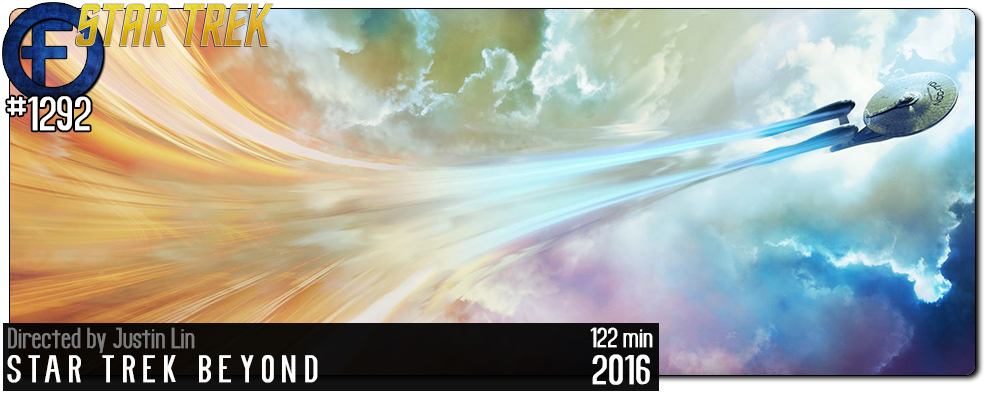
Principal Cast : Chris Pine, Zachary Quinto, Karl Urban, Zoe Saldana, John Cho, Anton Yelchin, Sofia Boutella, Idris Elba, Joe Taslim, Lydia Wilson, Deep Roy, Melissa Roxburgh, Shohreh Aghdashloo, Greg Grundberg.
Synopsis: The USS Enterprise crew explores the furthest reaches of uncharted space, where they encounter a new ruthless enemy who puts them and everything the Federation stands for to the test.
********
Vertiginous, effortlessly charming Trek entry that generates mild enthusiasm and cavalier action sequences without really returning us to the halcyon days of the 2009 reboot, Star Trek Beyond offers a return to service for the crew of the Enterprise and throws up a new villain in the form of Idris Elba’s maniacal Krall. Showcasing the latest visual effects (as you’d expect), and reprising some of the rebooted franchise’s winningest combination punches of character conflicts, Beyond’s adventure through the stars comes with all the panache you’d expect and a surprisingly taciturn sense of fun: while things go boom and vroop and clang, you’ll be swept along with Kirk and Co’s voyage but in the quieter moments (not that there’s many, I’ll admit) you start to realise just how much you miss the original Kirk, Scotty and Spock.
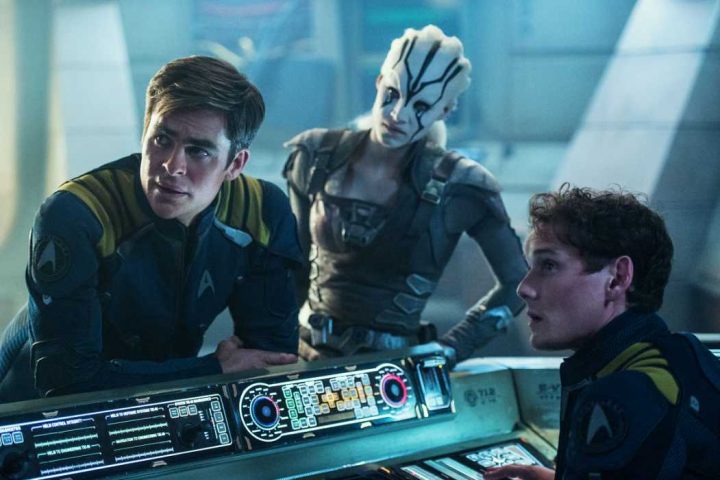
Midway through their 5-year mission to explore the galaxy, the crew of the starship USS Enterprise, captained by James T Kirk (Chris Pine, sporting a worse haircut than Mark Hamill in the original Star Wars, it must be said), have become a little institutionalised aboard the vessel, and so stop over on the Federation’s gravity-defying spaceport, Yorketown. Whilst ashore, a mysterious refugee arrives, claiming to be an escapee of a mysterious presence inside an enormous nebula out in space. Sent to investigate, the Enterprise crew find themselves betrayed and attacked, leaving the ship a ruin on the surface of a desolate planet and the plans of nefarious Krall, whose link to the Federation becomes a crucial element in Kirk’s plan to stop him, become a do-or-die mission for the stranded crew.
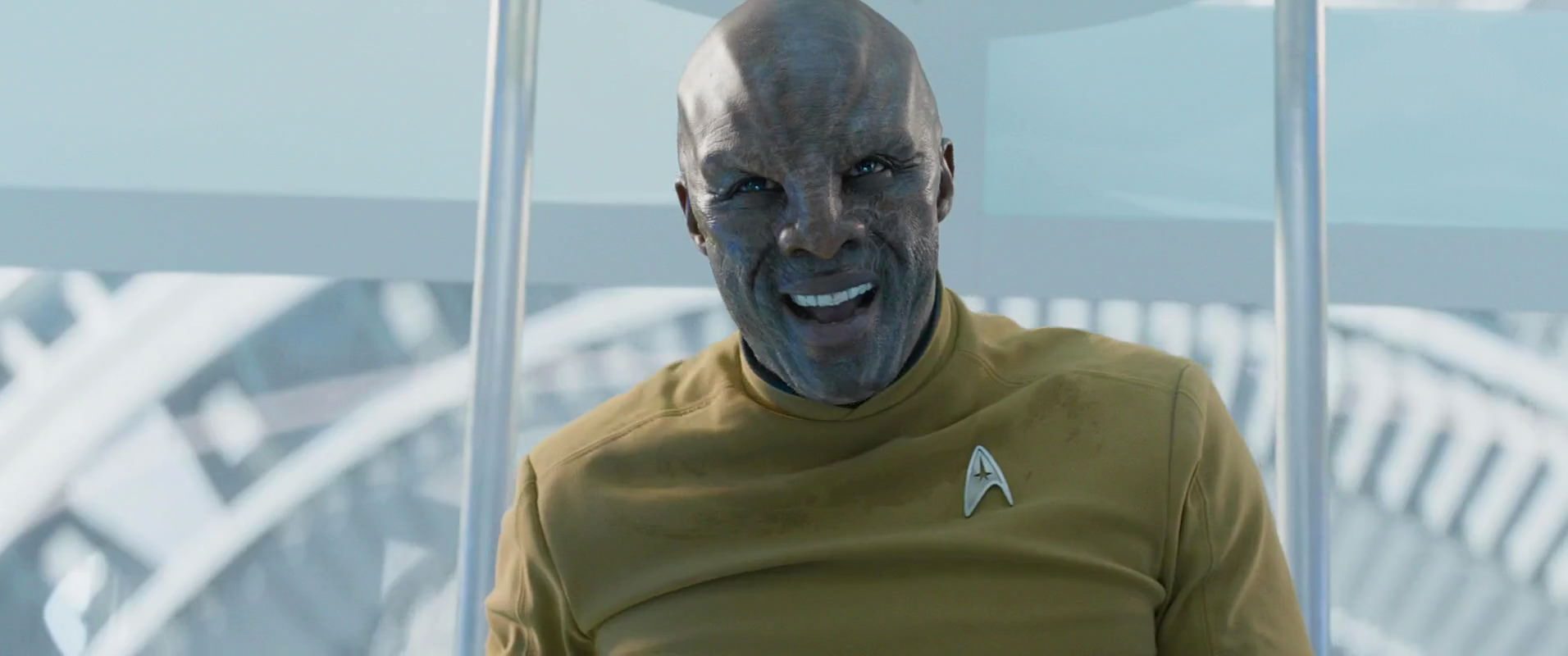
Taking over from journeyman director JJ Abrams, incoming helmer Justin Lin, late of the Fast & Furious franchise, delivers what can only be described as a rousing spectacle (that’s the kind of shit they put on posters, don’t you know) as he skewers every possible dimension of space in depicting the latest Trek adventure. Up is down, gravity is defied, and no doubt gimble-makers in the greater Los Angeles area have a hefty retirement fund for later thanks to Lin’s spatially challenging prowess, in which the true axial nature of space is given thorough exploration via flipping camerawork and stellar production design. The film hits its marks in the action quotient, and for the most part is genuinely exciting, if not entirely as mysterious as it makes out (long-time viewers of Trek will probably spot what’s coming a long way off, as I did after much guesswork), but things shudder to a halt when the film is forced to spend time developing character, backstory, and plot.
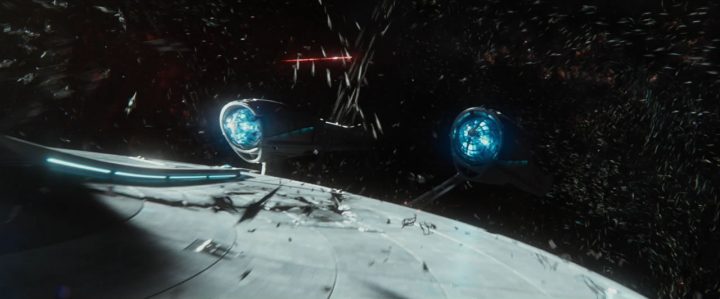
As with all the canon Trek films, Kirk is the central figure in it all, although tangentially Spock, by his very nature, is close behind. Here, Chris Pine’s Kirk has less an arc than he had in previous reboot films, so much so Beyond clearly becomes more about Spock, Uhura, Scotty and Bones than it does their commanding officer. Zachary Quinto’s Spock, more tortured and fuelled by emotion than the late Leonard Nimoy’s essaying, lacks the hand-wringing and constipated delivery of past instalments and feels a tad more relaxed, while on-screen romantic interest Uhura, again portrayed by a criminally underused Zoe Saldana, provides mild chuckles as their crewmates pick apart the nature of their relationship (I mean, c’mon. They’ve been together for years by now, how is this thing even still a talking point?). Karl Urban’s Bones once again rattles off some nice DeForest Kelley-esque dialogue riffs, John Cho’s suddenly gay Sulu (part homage to original character interpreter George Takai, who is himself gay) inhabits a role too small for an actor obviously wanting to do more (not unlike Takai, if I’m not mistaken), while the film is tinged with melancholy at the final role to Anton Yelchin, who was tragically killed a month prior to the film’s theatrical release.
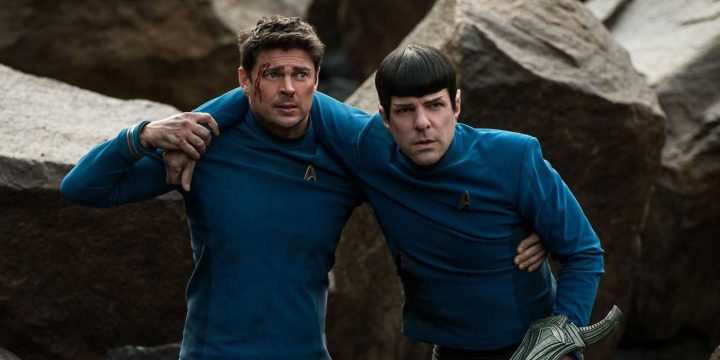
Newcomers to the franchise, Elba’s Krall, and Sofia Boutella’s Jaylah (she of the white face and black markings) offer breadth of world-building potential for Lin and the Trek crew to work with, and to his credit Lin established Jaylah as one of the better non-core supporting roles the franchise has yet offered up. But again, both Jaylah and the growling, hunted performance of Elba (hidden beneath layers of stunning makeup) are ill-served by a story more interested in bells and whistles than the thing Trek is best known for: story, and characters. In the rush to destroy the Enterprise (not a spoiler, you’ve seen the trailers) and fling the camera and editing button around like a dervish, Lin’s film shimmys and shakes like a big-budget production ought to, but it’s weakest when serving the characters. The writing, apparently beefed up by Trek fanatic Simon Pegg (once again having a blast as Scotty here), is the weakest of the rebooted films to date, a hodgepodge of tropes and archetypes that don’t feel as fully fleshed out as previous instalments have offered, and the contrivance of logic-defying knowledge and plot twists do make one roll one’s eyes from time to time.
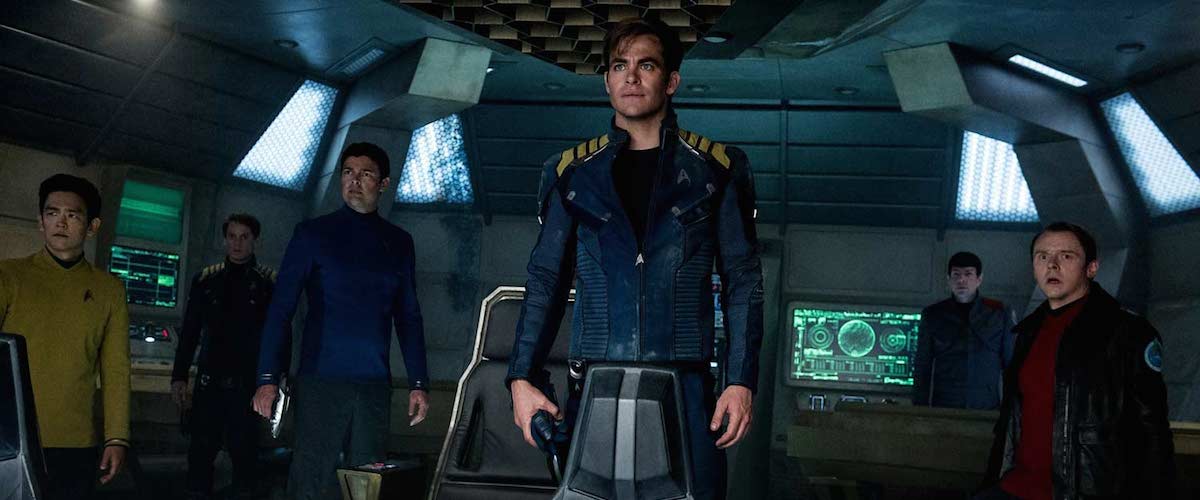
But it looks so pretty, and if that’s all Trek has going for it we’re all the poorer for it. Trek is best in long-form storytelling, over episodic television rather than a 90 minute flight of fancy on the big-screen. While we’ve come to know and love these new iterations of the classic characters (mostly, I guess), Beyond seems unwilling to take them someplace new emotionally, even though they find themselves scattered across an entire planet physically, and the film lumbers with this idea. Some of the laughs land well, some of them fall flat, and the villain’s motivations don’t really feel solid enough to justify a big screen telling other than to spend money on gigantic visual effects sequences.
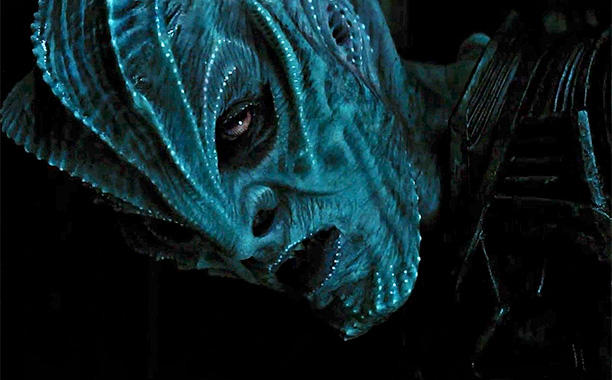
In a surprising development, I actually found Star Trek Beyond to be the least coherently edited film of the franchise to-date. Lin, a master craftsman on the fourth, fifth, sixth and seventh Fast & Furious films, has honed his ability to convey parallel storylines and multiple characters with apparent ease, yet Beyond feels fragmented and disjointed, as if the glue holding it all together is coming apart and he’s desperately trying to stick is back. Scene segues are clunky and awkward, transitions feel less fluid than the Abrams way (even if you hate Abrams, the man can compose tension in a series of scenes like a master) and Lin seems hell-bent on cutting away from the action mid-moment to keep us up-to-date with a secondary or tertiary (and less interesting) plot beat. It’s weird, but Beyond just feels poorly edited, and given it’s Justin Lin at the helm – he who gave us one of the GOAT action sequences in Fast Five’s vault chase – this is exceedingly disappointing.
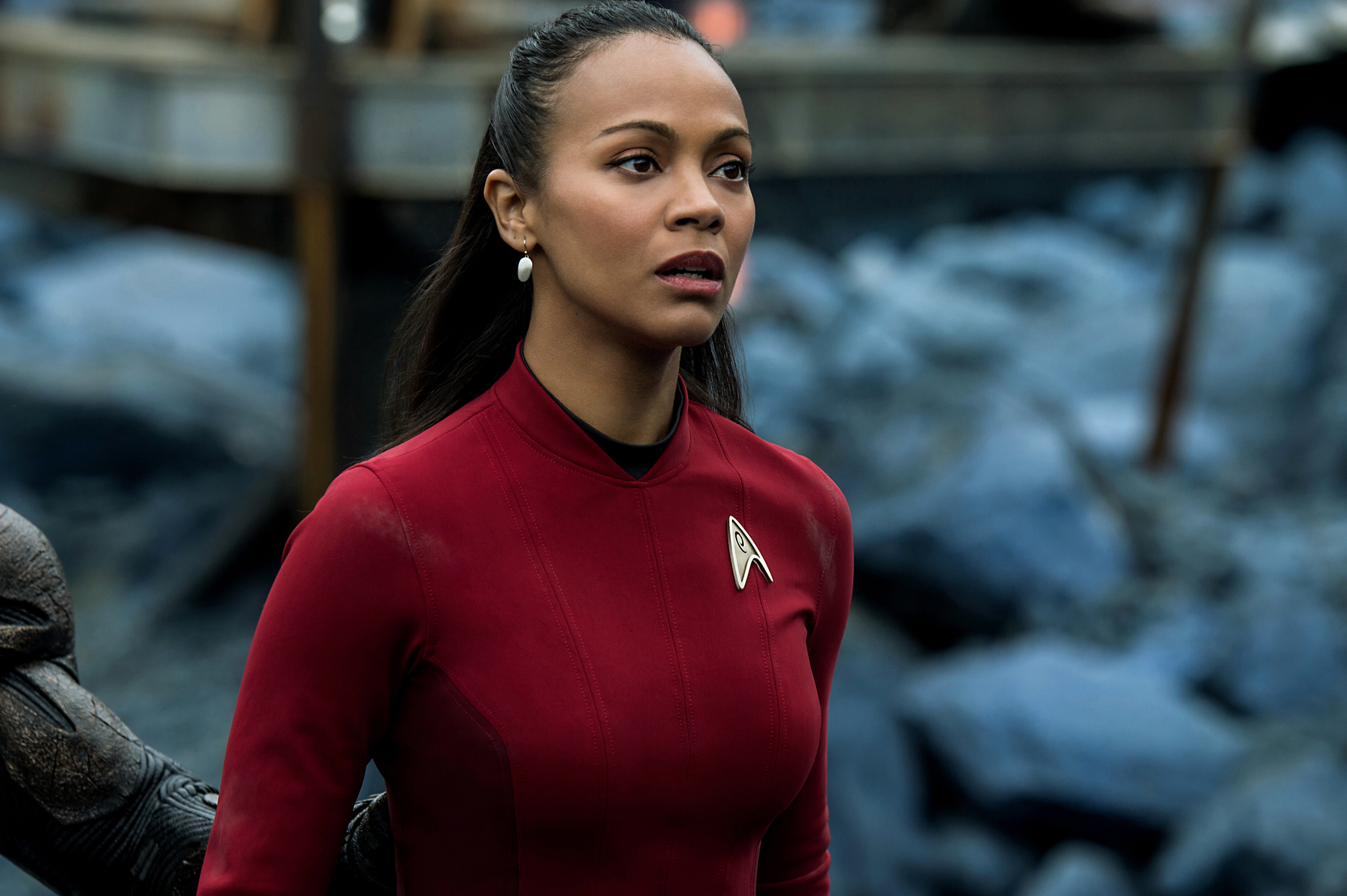
Once the Enterprise is destroyed by Krall’s forces, Kirk and his crew are separated by distance across the surface of a planet inside the nebula, and as they try to gather together, each pairing is given a chance to solidify and mature; Sulu and Uhura are captured by Krall, Scotty meets Jaylah and discovers her “home” is actually a long-dormant Federation vessel, and Spock and Bones find solace in medical humour as the wounded Vulcan (physically and mentally) attempt to escape capture. These character beats should be the heart and soul of Beyond’s emotional arc, but they aren’t.
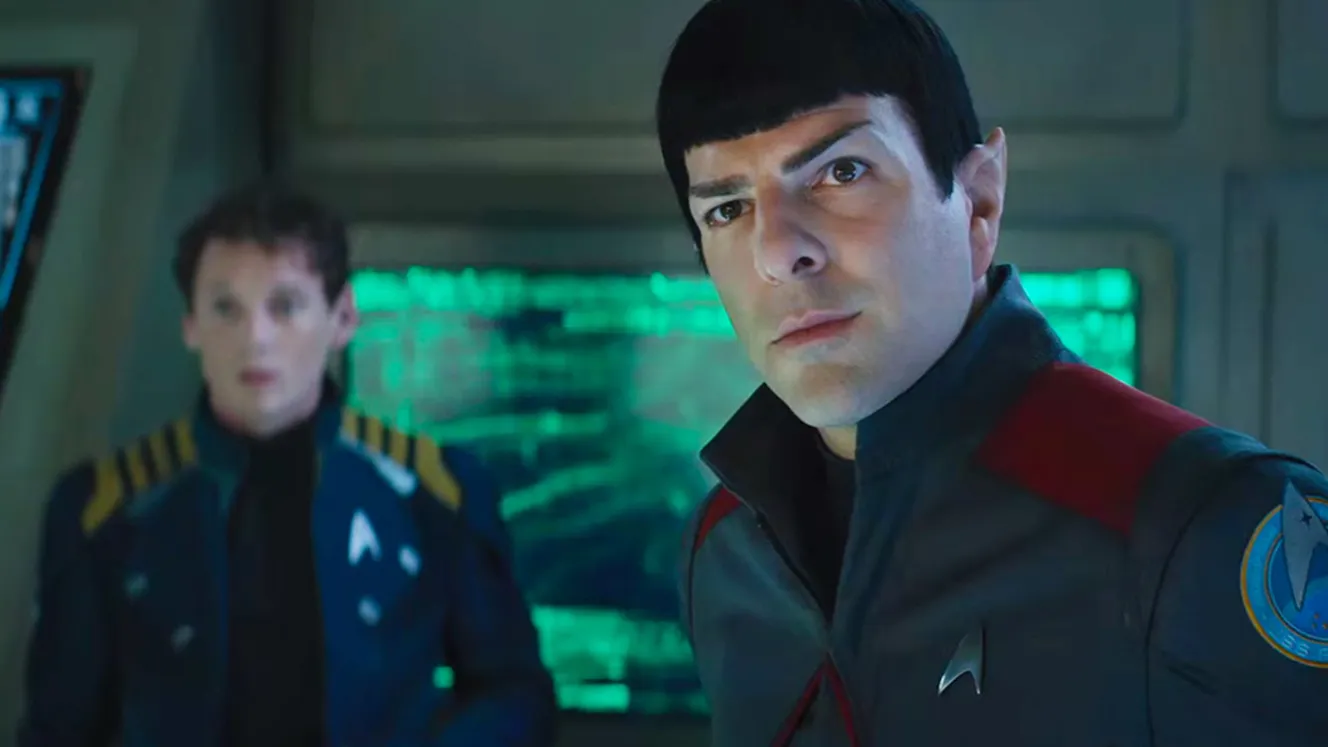
That’s not to say I didn’t enjoy Beyond, because I really did. It raised the pulse in various moments, it made me question things in others, while the central mystery of the movie – who is Krall – is resolved easily if you’re paying attention and a long-time sci-fi viewer. But it felt more diversionary than both the original Star Trek and Into Darkness ever did; for all their faults, the preceding two films felt considerably more robust overall even if the original lacked a compelling villain and the sequel mistakenly gave everyone a villain we didn’t really know we didn’t want. Competently stylish in moments (particularly when the action shifts into the weightlessness of space) but underwhelming in its edit and overall character mis-en-scene, Star Trek Beyond is less a solid big screen outing for the franchise than it is simply a timid, run-of-the-mill sci-fi opera, which is something you expect from some films but never from a franchise as iconic as Trek.

Have to agree and disagree with you on this. No way is this the worst written of the reboot films. Did you forget how fucking terrible Into Darkness was? You must have. It's an absolute trainwreck in the writing department. Also, I really enjoyed the different pairings, like Kirk and Chekov (for one example) instead the usual, tired trio of Kirk, Bones, McCoy. I thought the action sequences were really fun.
Admittedly, like you said, not all of it works. The destruction of the Enterprise came too early, and definitely wasn't earned. Uhura and Sulu are still way too underused. And the editing was too spazzy for my taste.
Overall, though, I think it was fun, and far better than the previous film.
See, I didn't mind the writing in Into Darkness (aside from the obvious Kaaaaaaaahhhhhhnnnnn moment) and felt it was the equal of the first rebooted film. I may have to revisit it again soon to reevaluate, but I never felt it was the trainwreck level of garbage you do…
Agree re Enterprise's destruction: it wasn't earned, as you say, and felt more a hurdle for the story to overcome than an actual emotional beat for Kirk to really understand the loss of the ship and what it might mean for his immediate future. Also agree re Sulu and Uhura – both criminally underused in this instalment. At least in the first film the entire cast had their moments and spread evenly throughout the film, but this one seemed too confined to Kirk, Spock, Bones and the poorly realised villain. (IMO)